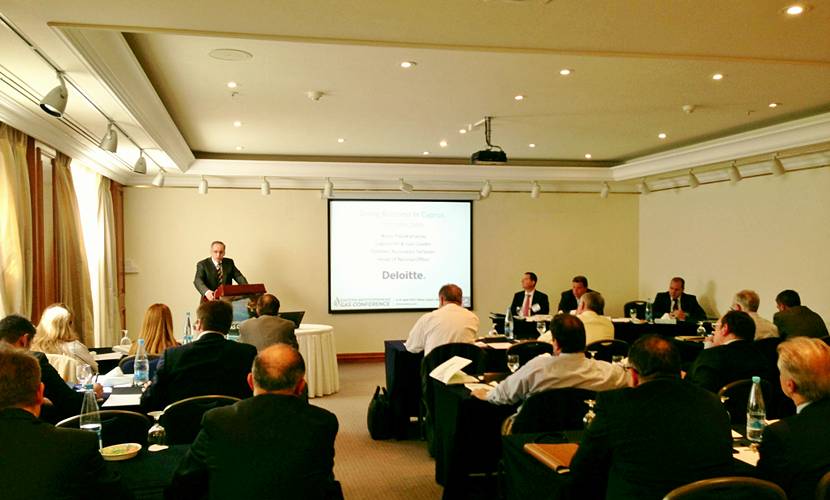EMGC '13: Natural gas executives examine benefits of business in Cyprus
By Adrienne Blume
Managing Editor
NICOSIA, Cyprus -- As activity continues in the Eastern Mediterranean, where an estimated 35 trillion cubic feet of recoverable natural gas reserves have been discovered, industry-leading companies are preparing to increase their regional presence. Exploration, drilling and production projects are underway, and plans for gas processing and transportation facilities are in progress. According to industry experts, gas exports could commence as early as 2019.
 At Gulf Publishing Company’s inaugural Eastern Mediterranean Gas Conference (EMGC) in Nicosia, executives from operating, service and technology companies active in the region are sharing insight into development opportunities for this exciting resource area.
At Gulf Publishing Company’s inaugural Eastern Mediterranean Gas Conference (EMGC) in Nicosia, executives from operating, service and technology companies active in the region are sharing insight into development opportunities for this exciting resource area.
The conference, which is taking place from April 8–10 at the Hilton Cyprus, features speakers from top companies operating in the region. EMGC media sponsor Deloitte hosted a workshop on Monday afternoon, “Doing Business in the Mediterranean,” which drew over two dozen attendees from companies around the world seeking to share knowledge and gain information about regional economic conditions and tax and customs laws, as well as managing human resource challenges in the oil and gas industry.
Restructuring Cyprus’ economy. Marios Tannousis of the Cyprus Investment Promotion Agency (CIPA) opened the workshop with a presentation on how Cyprus’ economy should be reshaped after the recent, €10 billion bailout agreement by the “Troika,” which consists of the European Commission, the European Central Bank and the International Monetary Fund.
Mr. Tannousis noted that CIPA’s role in restructuring the Cyprus economy includes promotion, advocacy, and investor support, along with clarifying and harmonizing regulations for investors. As a non-profit organization, CIPA seeks to promote foreign direct investment (FDI) in Cyprus as a mechanism for growth. The government is also seeking to fully liberalize foreign FDI and ensure equal terms for foreign companies with local investors.
Mr. Tannousis asserted that the benefits of oil and gas extraction will prove catalytic for the future reestablishment of Cyprus’ economy, as well as help improve domestic productivity and competitiveness.
Following Mr. Tannousis’ presentation, Nicos Papakyriacou, Cyprus Oil and Gas Leader for Deloitte and head of the company’s Cyprus office, introduced three of his Deloitte colleagues: Paul Mallis, Cyprus Oil and Gas Tax Leader and Partner at Deloitte Tax Services; Christos Papamarkides, Partner, Indirect Tax Services at Deloitte Ltd.; and George Pantelides, Oil and Gas Specialist and Partner at Deloitte’s Human Capital division.
Corporate tax rules. Mr. Mallis first spoke about corporate tax in Cyprus and explained when and how foreign firms become tax eligible. He also addressed the tax and visa implications of sending foreign workers to Cyprus. The country’s low tax rate of 10%, which will move to 12.5% after the agreement with the Troika, is an attractive reason for doing business in Cyprus.
Additionally, Mr. Mallis noted that preexisting tax treaties between Cyprus and foreign nations can offer significant benefits for oil and gas companies seeking to establish operations in the country. As an added bonus, capital allowances (i.e., tax depreciation) for plants and machinery can be favorable, at 10% to 25%, with oil barrels falling under the 25% rate.
VAT regulations. Next, Mr. Papamarkides offered information on the value-added tax (VAT) rules commonly followed in Cyprus. He noted that the country generally adopts the main rules of the EU’s established VAT legislation, and discussed instances where VAT is chargeable and when companies must register for VAT.
No VAT is charged for goods that are to be used directly on drilling rigs, Mr. Papamarkides explained. Furthermore, customs charges are not applied when goods and equipment are delivered directly to a drilling platform and do not pass through an airport or a seaport.
Human resource considerations. Lastly, Mr. Pantelides led a short discussion on employment legislation and requirements in Cyprus, and elaborated on how foreign companies can establish a local office in the country. Deloitte provides both recruitment assistance services and human resources infrastructure support services for companies seeking to do business in Cyprus.
The workshop concluded with a Q&A session, followed by a networking session over hors d’oeuvres and cocktails.
Workshop attendee and Nicosia-based Deloitte Tax Services Director Chrystalla Michael praised the workshop as an important way to let companies know about employer obligations for taxes and customs as well as human resources, particularly expatriates. One of the major benefits of doing business in Cyprus is the low corporate tax, Ms. Michael said. Even with the move from 10% to 12.5% after the Troika agreement, Cyprus’ corporate tax remains one of the lowest in the EU.
More from EMGC. Days 2 and 3 of EMGC will include technical presentations focusing on the regional implications, international impacts and market potential of the new energy resources; LNG and gas processing opportunities; infrastructure developments; and the future of the Eastern Mediterranean’s energy sector. Additionally, a gala dinner sponsored by Deloitte will take place on Tuesday evening for all conference attendees.
Stay tuned for additional coverage of Gulf Publishing Company’s inaugural Eastern Mediterranean Gas Conference in Cyprus.
Photo caption: Deloitte Oil and Gas Leader for Cyprus, Nicos Papakyriacou, introduces speakers at EMGC’s Monday afternoon workshop.






Comments